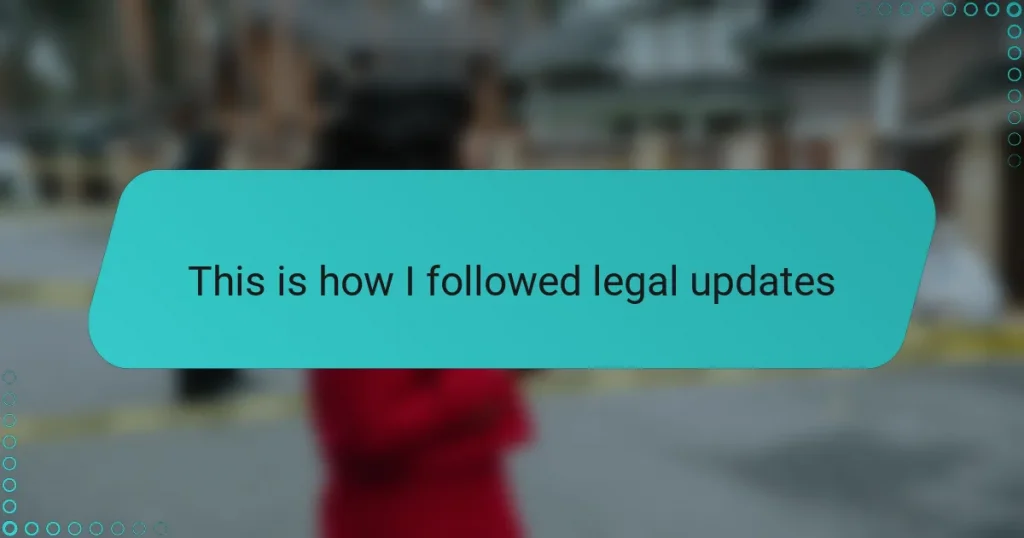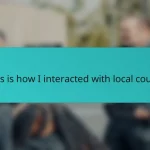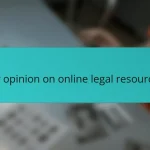Key takeaways
- Legal advocacy involves understanding the human impact of laws and staying connected to both legal frameworks and community needs.
- Staying updated on legal changes is essential for empowerment and effective advocacy, enabling informed and responsive actions.
- Utilizing tools like newsletters, legal tracking platforms, and social media helps maintain awareness of legal developments.
- Sharing legal knowledge effectively requires clear communication, engagement through dialogue, and tailoring messages to suit different audiences.
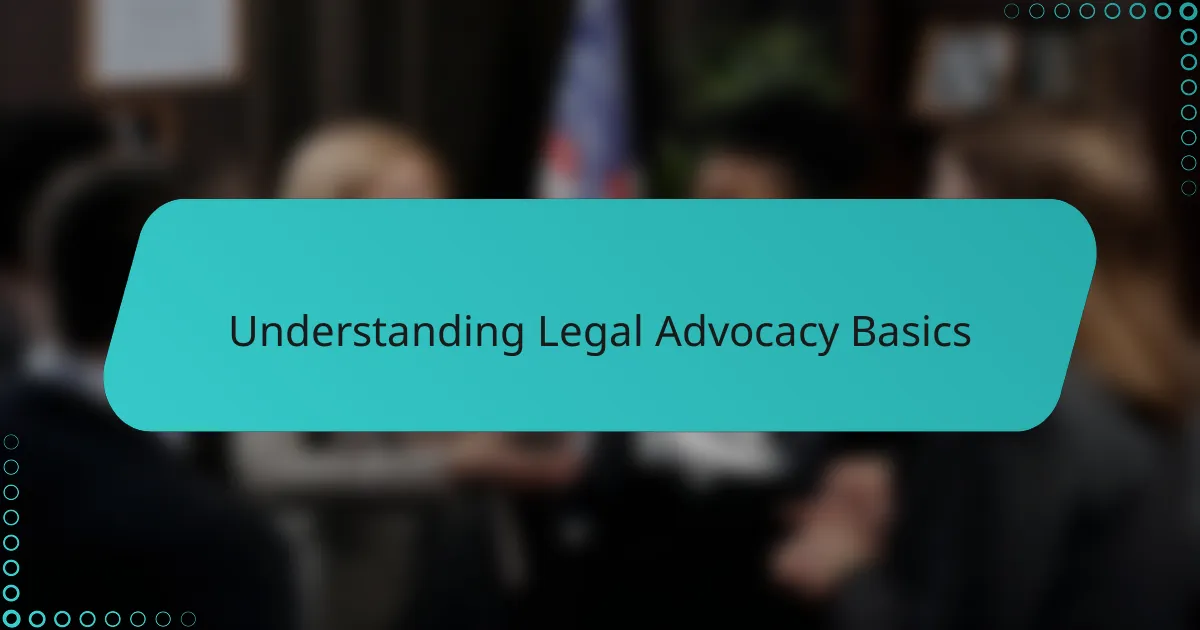
Understanding Legal Advocacy Basics
Legal advocacy, to me, is all about giving a voice to those who might otherwise go unheard. When I first got involved, I realized it isn’t just about knowing the laws but understanding the human stories behind them. Have you ever felt the frustration of watching rules change without really knowing how they affect real lives? That feeling drove me to dig deeper.
At its core, legal advocacy means using knowledge and passion to push for fairness and justice. I remember how overwhelming it was at first—trying to grasp the basics while balancing empathy for the people impacted. It made me appreciate how essential it is to stay informed and connected with both the legal framework and the community.
What surprised me most is how dynamic legal advocacy can be. It’s not static; it shifts with each new development and challenge. I often ask myself, how can I stay effective in such a fast-moving space? That question has shaped my approach, turning learning into an ongoing, personal mission rather than a one-time task.
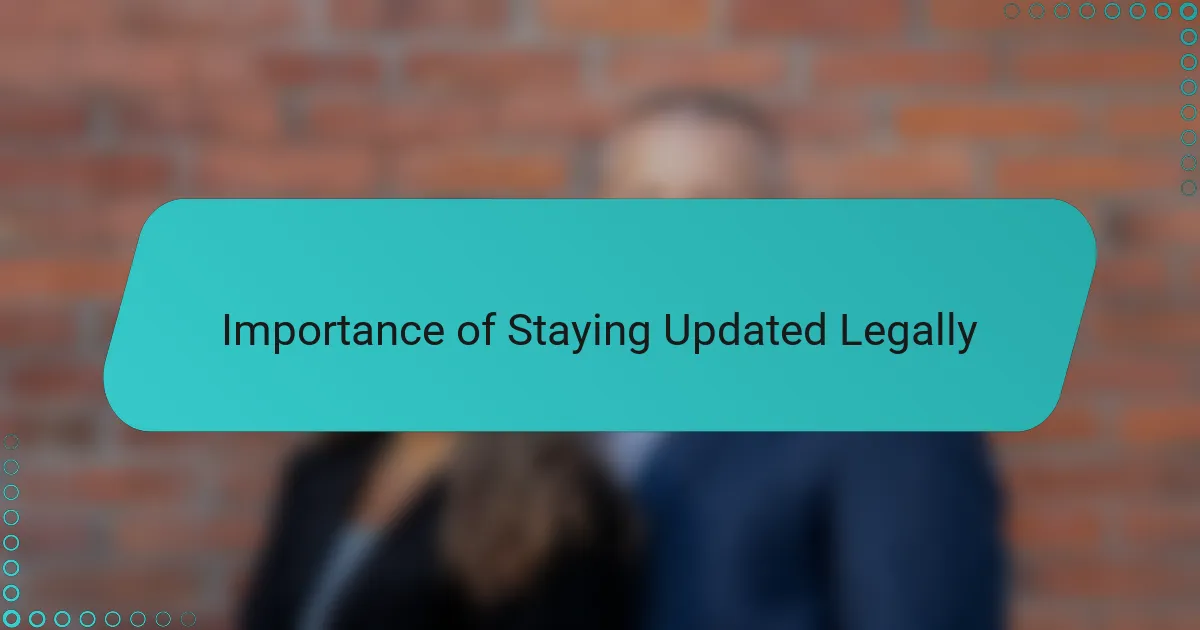
Importance of Staying Updated Legally
Legal landscapes are always evolving, and I’ve found that missing even a small update can lead to missed opportunities—or worse, unintentional missteps. Have you ever felt caught off guard by a new regulation? That sense of being one step behind is exactly what pushed me to prioritize staying updated.
Keeping current isn’t just about avoiding mistakes; it’s about empowerment. When I’m in the loop, I feel more confident advocating for change because I know my arguments are based on the latest realities, not outdated information. That confidence makes all the difference when representing others.
Sometimes, the sheer volume of updates feels overwhelming, but I remind myself why it matters. Legal shifts impact lives in very real ways, and by staying informed, I can respond quickly and effectively. Isn’t that the heart of what legal advocacy should be—responsive, relevant, and rooted in today’s truths?
![]()
Tools for Tracking Legal Changes
One of the first tools I relied on was email newsletters from trusted legal organizations. Honestly, getting those updates straight to my inbox made staying informed feel manageable rather than overwhelming. Have you ever noticed how a quick headline can spark your curiosity and lead you to deeper research? That small nudge can make all the difference.
I also started using specialized legal tracking platforms that send alerts whenever a law changes or a bill moves through the legislature. At first, it felt a bit technical, but soon I realized these tools were like having a personal assistant keeping me ahead of the curve. Doesn’t having that kind of real-time insight change how you approach advocacy?
Finally, I can’t underestimate the power of social media and professional networks. By following the right experts and joining focused groups, I get a steady stream of commentary and interpretation that helps me understand the practical impact of new laws. It’s like having a community that deciphers the legal jargon with you—something I’ve come to value deeply.
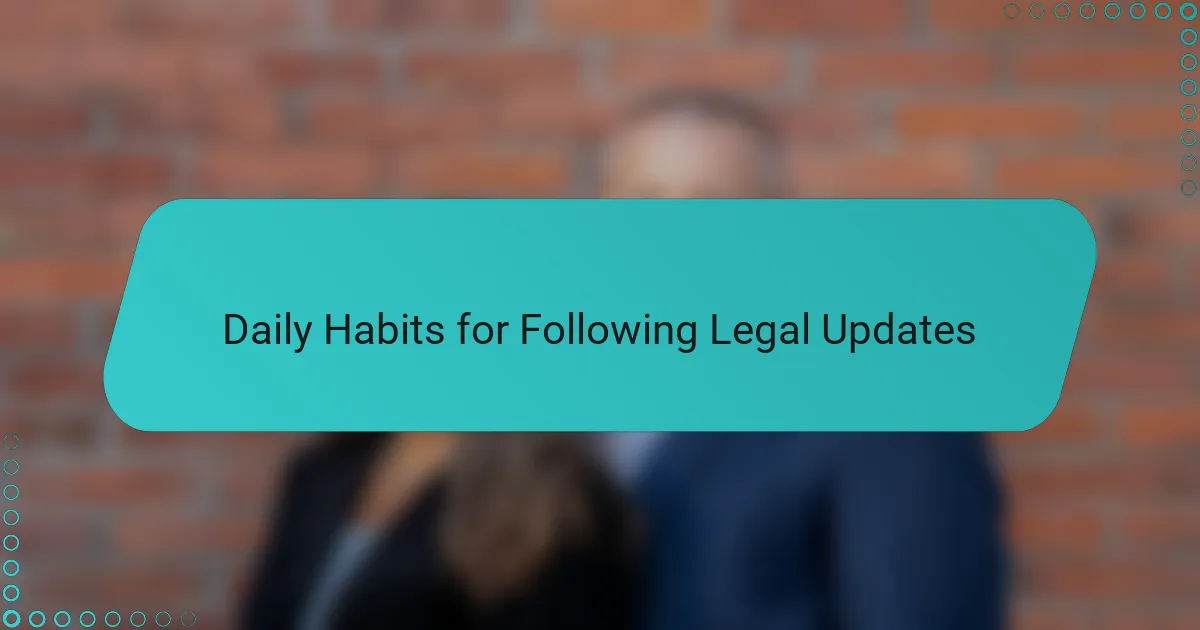
Daily Habits for Following Legal Updates
Every morning, I make it a habit to skim through a couple of trusted legal newsletters while having my coffee. It’s a simple routine, but it keeps me grounded in what’s new and relevant. Have you ever found that one headline in your inbox that completely shifts your perspective for the day? For me, those moments are reminders of why daily attention matters.
Sometimes, I set aside just fifteen minutes to browse legal tracking apps or platforms. Initially, I worried it would eat into my day, but actually, those quick check-ins prevent surprises later on. It’s like checking the weather before you leave the house—I’ve learned it’s easier to prepare and adapt when I know what’s coming.
I also chat with colleagues regularly, even briefly, about the latest cases or regulations. These quick conversations often spark insights I wouldn’t get from reading alone. Have you noticed how discussing legal updates turns abstract rules into real-world impact? That’s why daily connection—both with information and people—has become a cornerstone of how I stay informed.
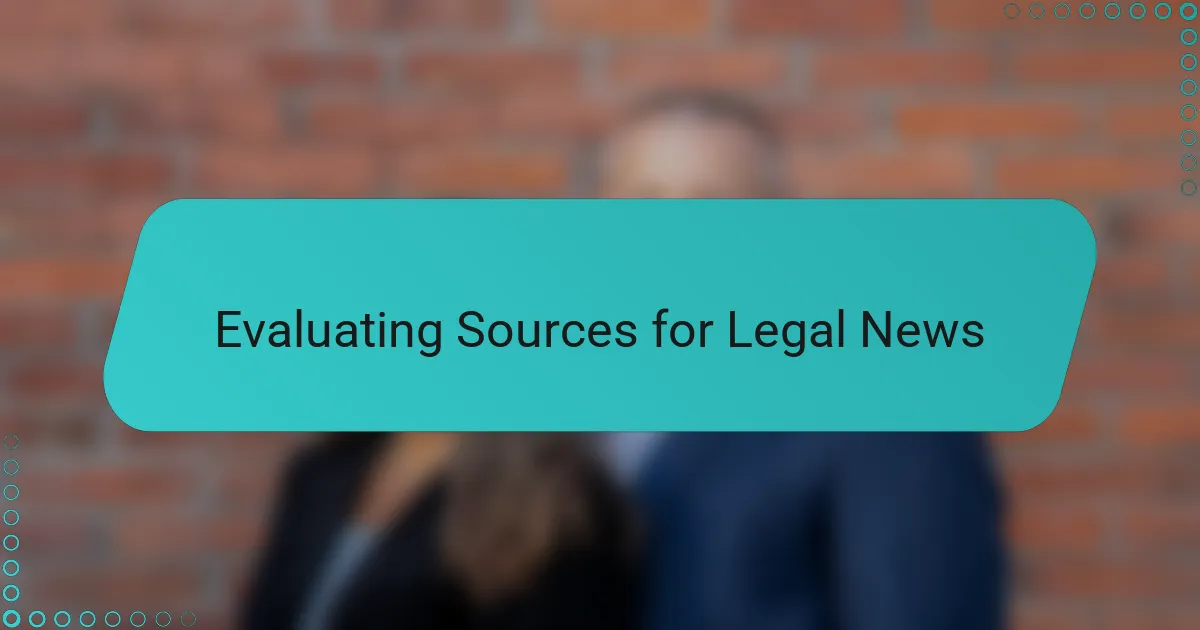
Evaluating Sources for Legal News
Evaluating sources for legal news has become a crucial skill in my experience. With so much information out there, I ask myself: can I trust this source to provide accurate, unbiased updates? I learned early on to favor well-established legal publications and official government websites because they deliver facts, not just opinions.
I’ve also noticed that not all legal news is created equal. Sometimes, a sensational headline grabs my attention, but digging deeper reveals a lack of context or even errors. Have you ever felt misled by a headline? That frustration taught me to cross-check information across multiple reputable sources before accepting it as truth.
Another thing I’ve found helpful is paying attention to the expertise behind the news. When legal experts or advocacy organizations comment on updates, their insights add depth and clarity. It’s like having a mentor walking you through complex changes—something I’ve come to rely on heavily in my own practice.
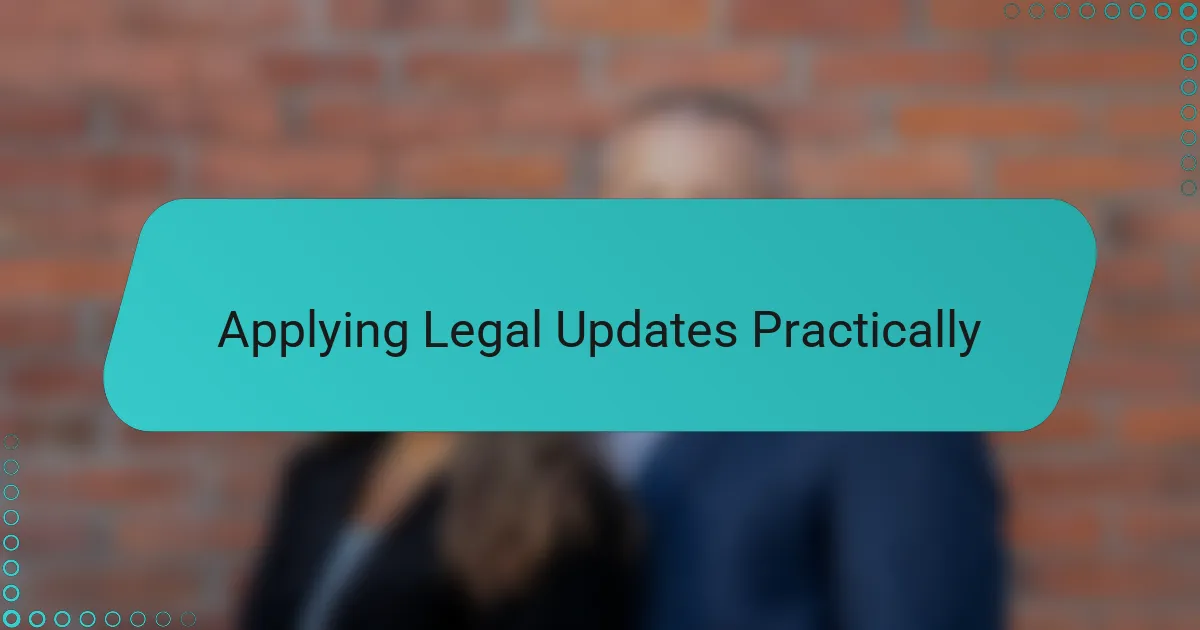
Applying Legal Updates Practically
Applying legal updates practically is where the work really comes alive. I remember the first time I had to adjust a client’s case strategy because a newly passed regulation changed the playing field overnight. It wasn’t easy at first—interpreting fresh rules and figuring out how they fit into ongoing cases—but that challenge pushed me to think creatively and stay flexible.
Have you ever wondered how to translate complex legal jargon into actionable steps? For me, it’s about breaking down updates into clear, concrete actions. Whether it means revising contracts, advising clients differently, or shifting advocacy tactics, practical application requires both a deep understanding and a willingness to adapt quickly.
One approach I found invaluable was running scenarios based on the new laws—almost like rehearsals before real-life application. This hands-on trial helped me anticipate potential hurdles and refine my methods before they impacted anyone directly. Isn’t it reassuring to know you’ve tested your responses before the stakes get high? That sense of preparedness has made all the difference in my legal advocacy.
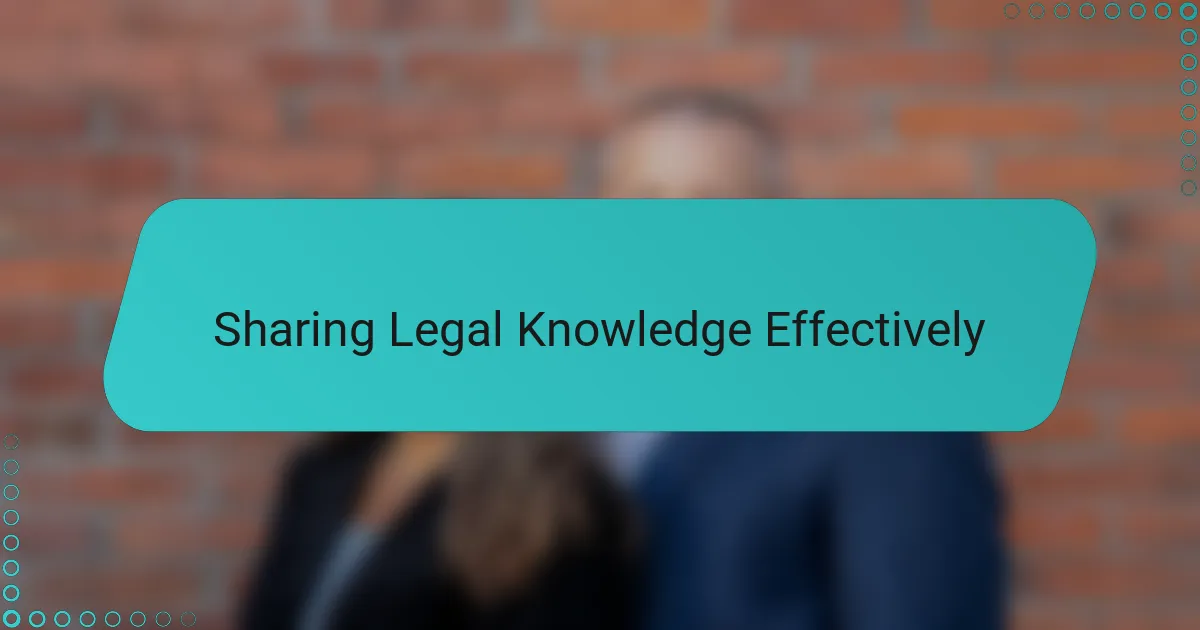
Sharing Legal Knowledge Effectively
Sharing legal knowledge effectively has been a journey of trial and error for me. Early on, I realized that simply dumping information isn’t enough; it’s about making complex legal concepts relatable and understandable for diverse audiences. Have you ever noticed how your eyes glaze over when legal jargon takes over? That’s why I focus on storytelling and clear examples—they bring the law to life and keep people engaged.
I also learned the power of dialogue in sharing legal knowledge. Instead of lecturing, I invite questions and encourage discussion, which helps uncover misunderstandings and deepens everyone’s grasp of the issues. It’s amazing how much more people absorb when they feel part of a conversation rather than passive recipients.
Finally, tailoring the message to the audience has been key. Sometimes, a community group needs straightforward guidance, while legal peers appreciate detailed analysis. Finding that balance means I listen carefully first—what do they already know, what do they need—and then I mold the information to fit. Does that extra effort really pay off? From my experience, absolutely. It builds trust and empowers others to engage confidently with legal matters.
